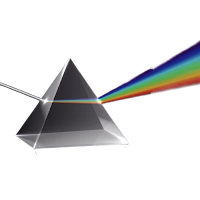Human : The spectrum of Identities
Have you ever considered the analogy of a prism reflecting colors to illustrate how humans reflect their identities?
A human does not suffer for reflecting his identity but he does suffer when he oppresses even one of them, just to take care of other's perception towards us. We are humans and it is our natural behavior to reflect a bunch of identities. Thus in order to live a prosperous life, we need not ill-treat our inner-selves, rather it is essential for us to bring out our personalities. Sometimes personality of an individual is being mistaken with his identity. Whether a person has an introvert, extrovert or an ambivert their identities can still fluctuate. Personality of an individual is the characteristic pattern of thinking, feeling and acting.
Typically, introverts are characterized as reserved and cautious, whereas extroverts tend to be sociable and highly expressive. When one shares a mix of both traits, the person is considered to be an ambivert and the personality falls in between of both poles.
The identity of a person defines who or what he is. It does not depend on a single thing that a person inherits rather it is a bunch of qualities that a person perceives. Identity of a person is the main criteria that can distinguish a person from the other. Human has an ability to inherit qualities from things and people around then. It lies in the eyes of the observer what identity of a person he wants to observe, analyze and inherit.
We should maintain our identity to strengthen our character and then we emerge out as stronger individuals. Our identity plays a crucial role in shaping our understanding and experience of the world, while also influencing the nature of opportunities and challenges that come our way.
Thus in order to live a prosperous life, we need not ill-treat our inner-selves, rather it is essential for us to bring out our personalities. Moreover, bringing out this spectrum of identities helps to change ourselves tremendously.
 |
| ONE PERSON YOU KNOW CAN HAVE DIFFERENT IDENTITIES |











Comments
Post a Comment